Explanation of my 10 Ballon d'Or 1979
This is my ranking, my opinion on the Ballon d'Or of the year 1979. This ranking is based on the calendar year, not the season. What counts for this ranking is the player's regularity over the calendar year, the number of matches played, the ability to raise his level in big games, statistics (goals, assists, clean sheets, goals conceded, etc.) and trophies won (collective and individual).
#10 Liam Brady
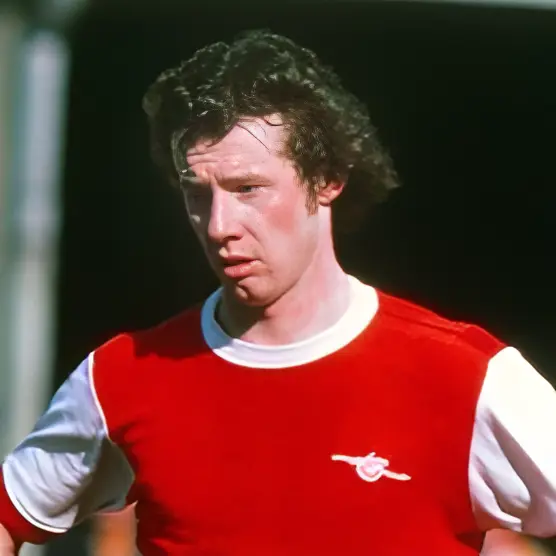
- Age : 22/23 years old
- Club : Arsenal FC
- Statistics : 62 games, 12 goals, / assists
- Trophies : English Cup, Finalist Community Shield
- Individual Awards : Premier League POTY, Premier League TOTY
In 1979, Liam Brady was the elegant rebel of English football, a left-footed maestro who made Highbury his stage and the ball his instrument. At 23, he was already Arsenal’s creative heartbeat, threading passes through defenses with a grace that felt more ballet than battle. That year, Brady reached his peak in red and white. He led Arsenal to FA Cup glory, dazzling in the final against Manchester United with a performance that was both ruthless and refined. His assist for Alan Sunderland’s dramatic late winner was pure Brady: vision, timing, and a touch that whispered genius. It wasn’t just a cup win—it was a coronation.
#10 Manfred Kaltz
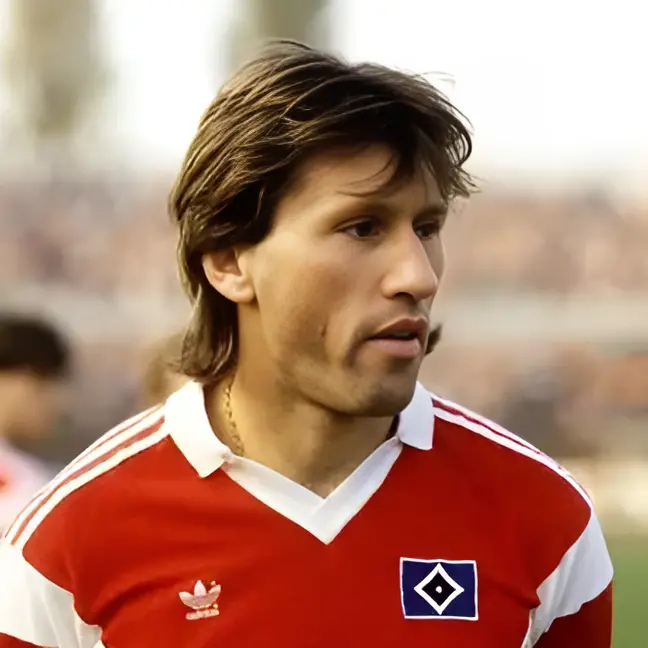
- Age : 26 years old
- Club : Hamburg SV
- Statistics : 49 games, 8 goals, 10 assists
- Trophies : Bundesliga
- Individual Awards : Bundesliga TOTY
In 1979, Manfred Kaltz was already redefining what it meant to be a full-back—a player who didn’t just defend, but dictated the rhythm of the game from the flanks. At 26, he was the engine of a rising Hamburger SV side, blending defensive grit with attacking flair in a way that felt ahead of its time. In the Bundesliga, Kaltz helped Hamburg mount a serious title challenge, and his consistency was unmatched. He scored goals, created chances, and anchored a defense that was as disciplined as it was dangerous going forward. Internationally, he remained a key figure for West Germany, starting in friendlies and building momentum toward what would become a triumphant Euro 1980 campaign. But 1979 wasn’t just a prelude—it was a statement year. Kaltz wasn’t just a defender. He was a metronome, a weapon, a system unto himself. In an era where full-backs were expected to stay home, he was already living in the future.
#9 Peter Shilton
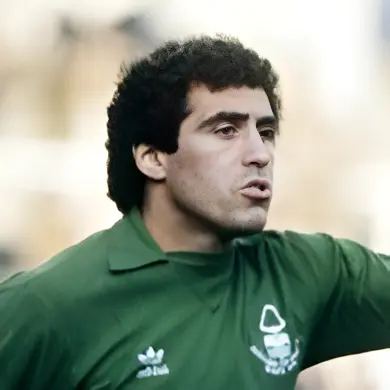
- Age : 29/30 years old
- Club : Nottingham Forest
- Statistics : 53 games, 52 goals conceded, 18 clean sheets
- Trophies : Champions League, UEFA Supercup, Premier League Vice-Champion, English League Cup
- Individual Awards : Champions League TOTY, Premier League TOTY
In 1979, Peter Shilton stood tall as England’s immovable last line of defense, a goalkeeper whose presence alone could rattle strikers before they even struck the ball. At 29, he was in the prime of his career, anchoring Brian Clough’s legendary Nottingham Forest side with a calm authority that bordered on mythic. That year, Shilton was a wall. Forest, with Shilton between the posts, didn’t just win matches—they suffocated opponents. His reflexes were razor-sharp, his positioning immaculate, and his command of the box absolute. In the European Cup, he was instrumental in Forest’s historic run, culminating in their first continental title in May 1979. Clean sheets weren’t just stats—they were statements. Domestically, he was just as dominant. Forest finished second in the First Division, and Shilton’s consistency was a major reason why. He didn’t make the highlight reels with flashy dives—he made them unnecessary by being in the right place before the shot was even taken. Internationally, he was England’s number one, building momentum toward Euro 1980. Though Ray Clemence still shared duties, Shilton’s performances were making it harder and harder to look past him.
#8 Michel Platini
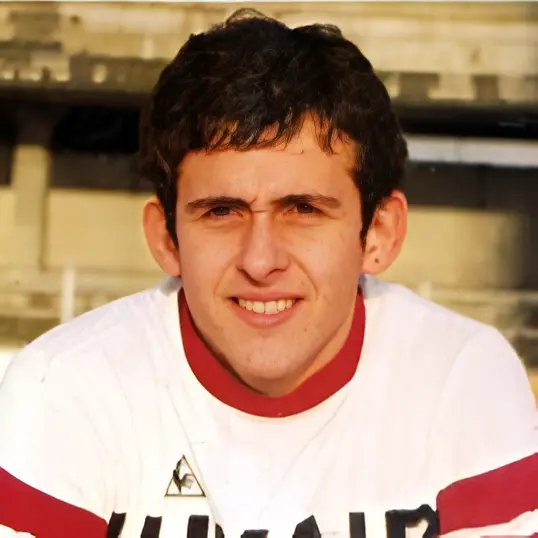
- Age : 23/24 years old
- Club : AS Nancy-Lorraine/ASSE
- Statistics : 44 games, 25 goals, / assists
- Trophies : /
- Individual Awards : /
In 1979, Michel Platini was already composing football like a symphony, orchestrating every movement with elegance, vision, and a touch of defiance. At just 24, he was the heartbeat of AS Nancy-Lorraine, a club he had carried on his back for years, and the French national team was beginning to revolve around his genius. That year marked a turning point. Platini transferred to AS Saint-Étienne in the summer, stepping onto a bigger stage with bigger expectations. But even before that move, he had already lit up the French Division 1 with his trademark free kicks, laser-guided passes, and that uncanny ability to slow time in the final third. He wasn’t just a playmaker—he was a conductor, and the pitch was his orchestra. Internationally, Platini wore the captain’s armband for France for the first time in 1979, a symbolic passing of the torch. He scored in friendlies, dictated tempo, and began shaping the identity of a team that would soon rise to continental glory. His performances were cerebral, but never cold—he played with a fire that simmered beneath the surface.
#7 Ruud Krol
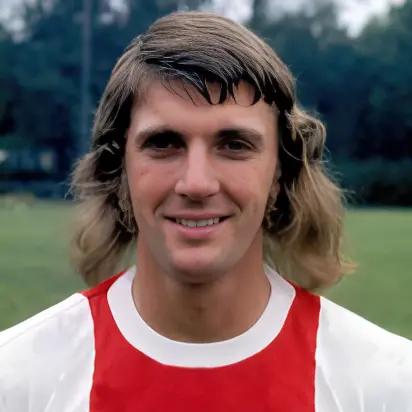
- Age : 29/30 years old
- Club : Ajax Amsterdam
- Statistics : 39 games, 7 goals, 5 assists
- Trophies : Eredivisie, Dutch Cup
- Individual Awards : Eredivisie TOTY
In 1979, Ruud Krol was the quiet architect of Ajax’s resilience and the Netherlands’ defensive soul, a player who didn’t need flash to dominate—just intelligence, timing, and total control. At 30, he was the last great standard-bearer of the Total Football era, and he wore that legacy like a second skin. That year, Krol was everywhere. For Ajax, he played over 30 matches across competitions, anchoring the backline with his signature blend of calm distribution and positional mastery. He wasn’t just a defender—he was a pivot, launching attacks from deep, reading the game two passes ahead. His left foot was a compass, always pointing Ajax in the right direction. Internationally, he remained a cornerstone of the Dutch national team, logging minutes in Euro 1980 qualifiers and friendlies. Even as the golden generation began to fade, Krol’s presence was non-negotiable. He captained with quiet authority, never shouting, just setting the tempo with every interception and pass.
#6 Karl-Heinz Rummenigge
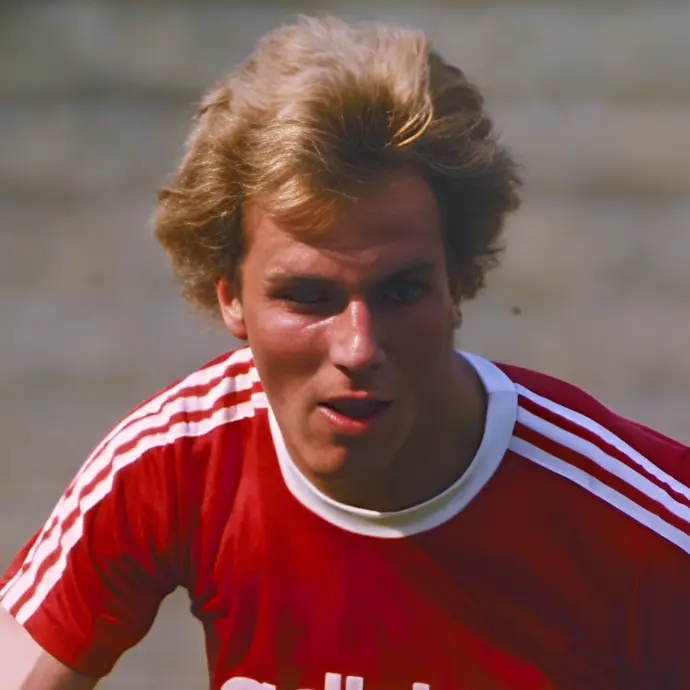
- Age : 23/24 years old
- Club : Bayern Munich
- Statistics : 50 games, 36 goals, 8 assists
- Trophies : /
- Individual Awards : Bundesliga TOTY
In 1979, Karl-Heinz Rummenigge was no longer just a rising star—he was a force of nature, slicing through defenses with a mix of power, precision, and poise that made him one of Europe’s most feared forwards. At 24, he was the spearhead of Bayern Munich’s attack, and his numbers were staggering: 26 goals in 34 Bundesliga matches, plus another 10 goals across the UEFA Cup and DFB-Pokal. He didn’t just score—he imposed himself. Whether it was a glancing header, a thunderous strike from distance, or a slaloming run through defenders, Rummenigge made it look inevitable. But 1979 wasn’t just about stats—it was about presence. He played every match like it was personal, with a relentless drive that lifted Bayern to a second-place league finish and deep European runs. His performances were so commanding that he finished second in the Ballon d’Or voting, behind only Kevin Keegan. Internationally, he was already a pillar for West Germany, sharpening his game ahead of Euro 1980. His versatility—able to play as a winger, second striker, or center forward—made him indispensable. He wasn’t just a goal scorer; he was a system-breaker.
#4 Kevin Keegan
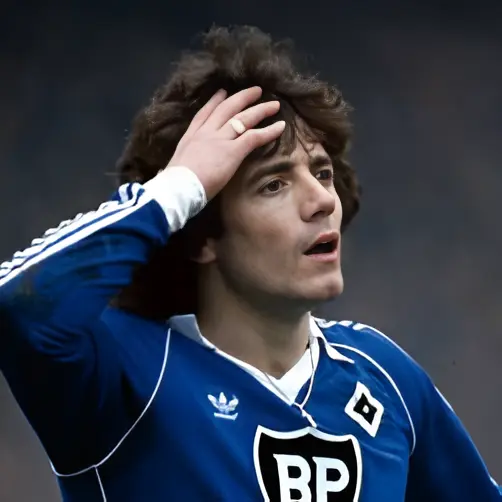
- Age : 27/28 years old
- Club : Hamburg SV
- Statistics : 46 games, 23 goals, / assists
- Trophies : British Home Championship, Bundesliga
- Individual Awards : Bundesliga TOTY
In 1979, Kevin Keegan was the undisputed king of European football, a whirlwind of energy, charisma, and relentless drive who had conquered both England and the continent. At 28, he was in his second season with Hamburger SV, and his impact was seismic—not just in goals, but in leadership, intensity, and sheer will. That year, Keegan led Hamburg to the Bundesliga title, their first in nearly two decades. He was the spark in a team full of steel, combining English grit with German precision. His movement off the ball was tireless, his finishing clinical, and his presence magnetic. Whether dropping deep to link play or bursting into the box, Keegan was everywhere—and always dangerous.
#3 Falcão
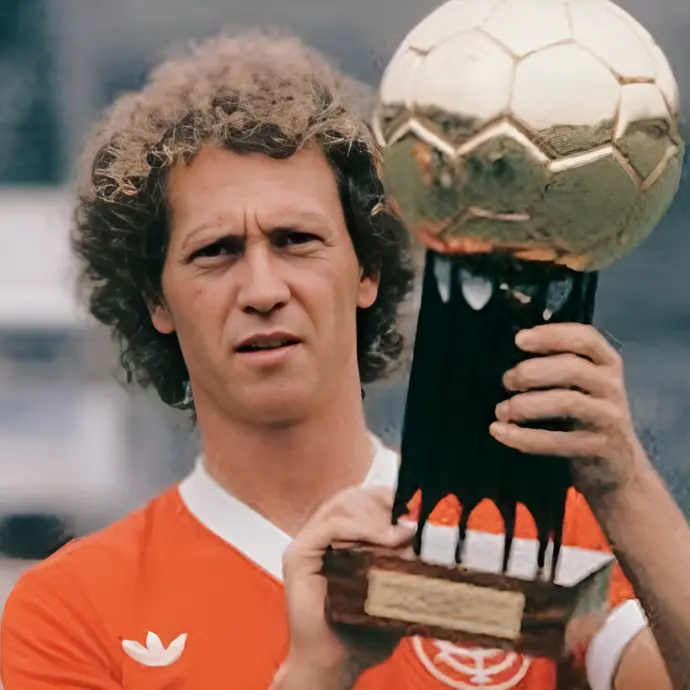
- Age : 25/26 years old
- Club : SC Internacional
- Statistics : 65 games, 17 goals, / assists
- Trophies : Brazilian League
- Individual Awards : Brazilian POTY, Brazilian League POTY, Brazilian League TOTY
In 1979, Paulo Roberto Falcão was the undisputed maestro of Brazilian football, a deep-lying playmaker who didn’t just control matches—he elevated them. At 25, he was in his final full season with Internacional, and he made it count in a way that still echoes through the club’s history. That year, Falcão led Internacional to an unbeaten Brazilian championship title—the only invincible campaign in the history of the Brasileirão. He wasn’t just the engine of that team; he was its soul. With his elegant stride, pinpoint passing, and uncanny ability to dictate tempo, Falcão turned midfield into a canvas. He scored 5 goals in 20 Série A matches, but his influence went far beyond the stat sheet. His performances were so dominant that he earned the highest-ever rating in the history of Placar magazine’s Bola de Ouro, Brazil’s most prestigious individual award. A 9.20 out of 10—untouched before or since. That wasn’t just excellence. That was transcendence. Internationally, he was already a fixture in the Seleção, laying the groundwork for the legendary 1982 World Cup side. But 1979 was his coronation at home—a year where he wasn’t just the best player in Brazil. He was the standard. Falcão in 1979 wasn’t playing football. He was composing it. And every note still resonates.
#2 Diego Armando Maradona
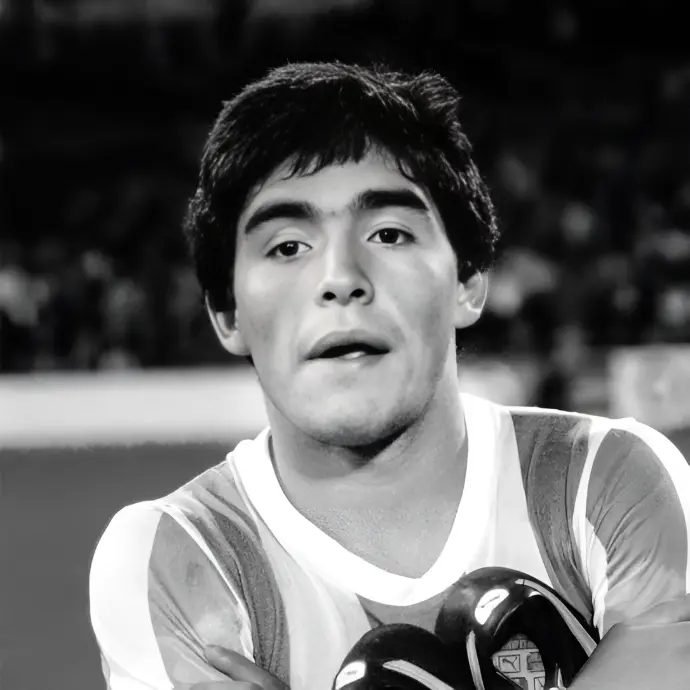
- Age : 18/19 years old
- Club : Argentinos Juniors
- Statistics : 42 games, 35 goals, 7 assists
- Trophies : Under-20 World Cup, Finalist Under-20 Copa America, 75th Anniversary FIFA Cup
- Individual Awards : South-American POTY, Argentine POTY, Under-20 World Cup POTY, Under-20 World Cup TOTY, Argentine League POTY, Argentine League TOTY, Argentine League Golden Shoe (26 goals
In 1979, Diego Maradona didn’t just announce himself to the world—he detonated onto the global stage, a teenage prodigy with the swagger of a veteran and the touch of a magician. At just 18, he was already the heartbeat of Argentinos Juniors, dazzling crowds in the Argentine Primera División with goals that defied physics and dribbles that left defenders frozen in time. But it was on the international stage that Maradona truly became El Pibe de Oro. That year, he led Argentina to victory at the FIFA World Youth Championship in Japan, scoring in the final and earning the Golden Ball as the tournament’s best player. His performances were electric—equal parts artistry and audacity—and he finished as the tournament’s second-highest scorer behind Ramón Díaz. Back home, he netted 26 goals in 32 league matches for Argentinos Juniors, a staggering return for a teenager in a rugged league. Every touch, every feint, every no-look pass felt like a glimpse into the future of football. He wasn’t just playing the game—he was reinventing it.
Winner : Zico
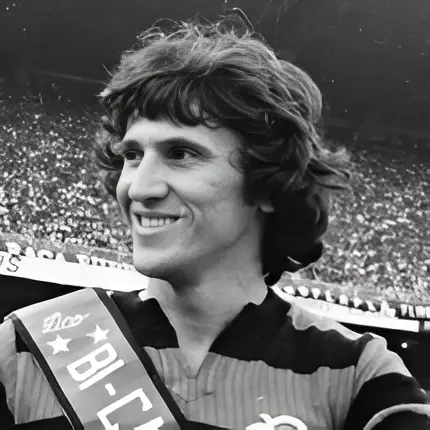
- Age : 25/26 years old
- Club : Flamengo
- Statistics : 56 games, 70 goals, 13 assists
- Trophies : Rio Championship, Guanabara Cup
- Individual Awards : Rio Championship POTY, Rio Championship TOTY, Rio Championship Golden Shoe (34 goals)
In 1979, Zico wasn’t just the best player in Brazil—he was arguably the best on the planet, a footballing force who blurred the line between artist and assassin. At 26, he was in full bloom at Flamengo, and what he accomplished that year borders on the mythical. Let’s start with the numbers: 70 goals, 89 adding friendly games. That’s not a typo. That’s a storm. And he did it despite missing part of the season due to injury. Had he played the full year, Flamengo’s own historians believe he could’ve broken the 100-goal mark. But Zico wasn’t just a scorer. He was the conductor of Flamengo’s golden age, dictating tempo from midfield with a blend of vision, technique, and audacity that made him untouchable. Free kicks bent like physics was optional. Passes threaded through impossible angles. And goals—goals from everywhere. Internationally, he added two goals in the 1979 Copa América and helped Brazil to a bronze medal. But more than trophies, it was the way he played: with elegance, with fire, with a sense of inevitability. He made the extraordinary feel routine. 1979 was Zico’s masterpiece—a year where he didn’t just dominate matches, he elevated them. In a world full of stars, he burned brightest. And he did it with a smile, a samba rhythm, and a left foot that could rewrite fate.